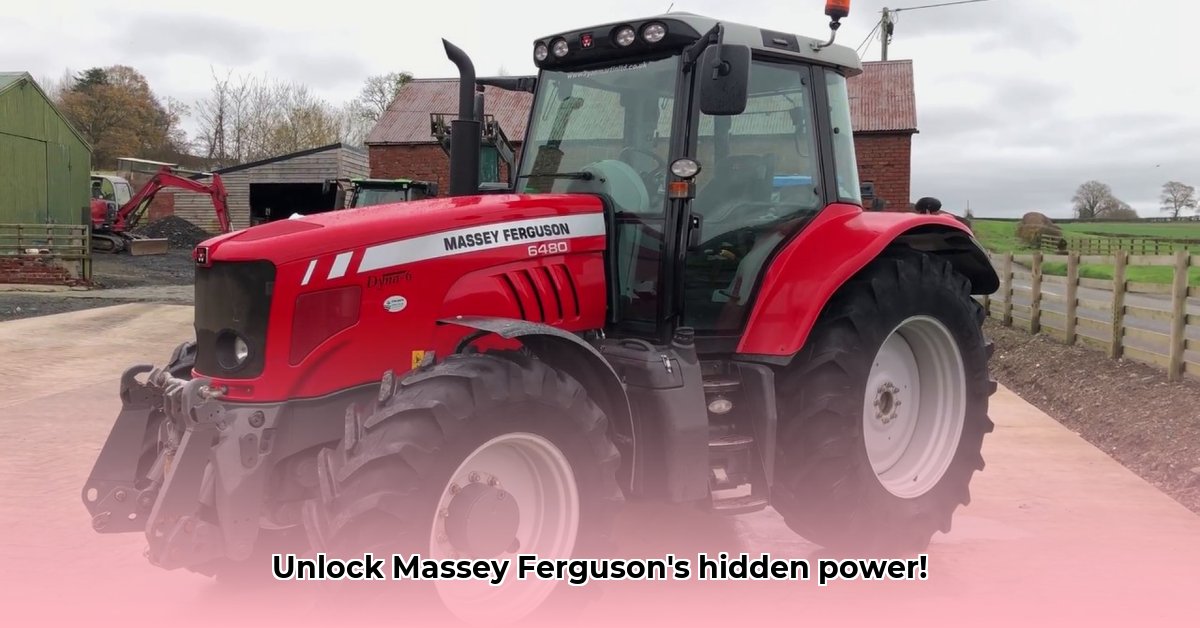
2010 Massey Ferguson Tractor: A Sustainable Farming Partner?
The 2010 Massey Ferguson tractor occupies a unique space in the world of sustainable agriculture. It's not the latest model with cutting-edge technology, but its robust design and adaptability make it a surprisingly relevant tool for environmentally conscious farming. This article explores how, with careful management and strategic upgrades, this workhorse can contribute significantly to more sustainable practices. For more on Massey Ferguson tractors, see this useful resource.
Fueling the Future: Efficiency and Environmental Responsibility
Fuel efficiency is paramount in sustainable agriculture. While a 2010 Massey Ferguson isn't as fuel-efficient as newer models, its fuel consumption can be significantly optimized. “Higher horsepower generally means greater fuel consumption,” explains Dr. Anya Sharma, Agricultural Engineer at the University of California, Davis. “But do you really need that extra power for every task? Careful workload planning is crucial.” This means prioritizing tasks, combining operations to reduce trips across the field, and adjusting tillage practices to minimize fuel usage. These simple steps can dramatically improve fuel efficiency and reduce the tractor's carbon footprint.
But isn't fuel efficiency only part of the equation? Aren't there maintenance considerations? Let's dive into the long-term perspective.
The Long Haul: Maintenance for a Sustainable Future
Regular maintenance of a 2010 Massey Ferguson is a cornerstone of sustainable farming. By extending the tractor's lifespan through preventative maintenance, you significantly reduce the environmental impact associated with frequent replacements. "Preventative maintenance lowers long-term costs and minimizes waste," notes Professor David Miller, Department of Agricultural and Biological Engineering, Purdue University. This proactive approach aligns directly with sustainable agriculture's core principles. Extending the machine's useful life translates to a smaller carbon footprint and reduced resource consumption. This isn't just about saving money; it's about responsible resource management.
How, then, does precision agriculture fit into the picture?
Smart Farming, Not Just Smart Tractors: Precision Agriculture and the 2010 Massey Ferguson
Precision agriculture emphasizes optimizing resource use. Although the 2010 Massey Ferguson lacks built-in GPS and advanced sensors, it's adaptable. The addition of aftermarket GPS guidance systems transforms it into a precision farming tool, enabling variable-rate fertilizer and pesticide application. This minimizes waste, maximizes yields, and reduces the environmental impact of chemical inputs. "This approach gets the most from existing resources, rather than solely relying on the latest tech," says Dr. Emily Carter, Soil Scientist at the USDA. "It’s a highly sustainable approach to farming."
Let's analyze the tractor's overall sustainability profile.
2010 Massey Ferguson Tractor: A Sustainability Checkup
| Feature | Advantages | Disadvantages | Sustainability Considerations |
|---|---|---|---|
| Fuel Efficiency | Potential for significant fuel savings through optimization; lower initial cost than new models. | Higher base fuel consumption compared to modern, high-efficiency tractors. | Optimize workload, use correct power levels, investigate fuel-saving add-ons (e.g., filters). |
| Technology Integration | Adaptable; aftermarket precision agriculture technology can be integrated. | Lacks built-in advanced technology. | Prioritize essential tech upgrades based on cost-benefit analysis; consider used options. |
| Longevity and Maintenance | Long lifespan achievable with proper upkeep, minimizing replacement needs and waste. | Requires diligent maintenance;potential for increased downtime if not maintained properly. | Regular servicing is an investment in long-term sustainability; plan for potential repairs. |
| Overall Sustainability Rating | Moderately sustainable; highly dependent on farmer's practices and additional investments. | Limitations in inherent design compared to newer, more efficient models. | Significant improvement possible through careful management and strategic upgrades. |
Taking Action: Sustainable Farming with Your 2010 Massey Ferguson
Here’s a practical roadmap to harness the 2010 Massey Ferguson’s potential for sustainable farming:
Honest Needs Assessment: Evaluate if the tractor's horsepower is truly necessary for all tasks. Consider whether a smaller tractor could handle certain operations, reducing fuel consumption.
Efficiency Enhancements: Implement precision agriculture techniques. Even basic GPS guidance systems drastically improve efficiency and reduce environmental impact by minimizing overlaps and fuel waste.
Preventative Maintenance: Adopt a rigorous maintenance schedule to extend the tractor's lifespan, reducing the need for replacements and associated waste. This investment minimizes long-term environmental impact and operational costs.
Strategic Upgrades: Consider cost-effective upgrades like improved fuel filters or more efficient tires when financially feasible. Prioritize improvements offering the greatest return on investment in terms of efficiency and sustainability.
In conclusion, the 2010 Massey Ferguson, while not a state-of-the-art machine, represents a viable and sustainable option for farmers. By adopting smart farming techniques and prioritizing maintenance and strategic upgrades, farmers can significantly reduce their environmental impact while enhancing the lifespan and efficiency of this trusty workhorse. It's about mindful farming, efficient resource management, and making the most of what you have, all of which contribute to a more sustainable future.